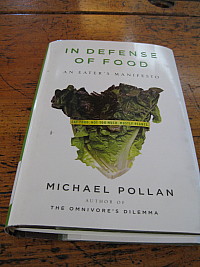http://www.michaelpollan.com/

(page 184)
"There's no escaping the
fact
that better food--whether measured
by taste or nutritional quality (which often correspond)--costs more,
usually because it has been grown with more care and less intensively. Not
everyone can afford to eat high quality food in America, and that
is shameful; however those of us who can, should. Doing
so benefits not only
your health (by, among other things, reducing exposure to pesticides
and pharmaceuticals) but also the health
of the people who grow the food as well as the people who live
downstream and
downwind of the farms where it is grown.
"Another important benefit of paying more for better-quality food is that you're apt to eat less of it."
"Another important benefit of paying more for better-quality food is that you're apt to eat less of it."
....
(page 185-186)
"It is well established that
how much we eat is strongly
influenced by the cost of food in terms both the money and effort
required to put it on the table. The rise in obesity in America
began
around 1980, exactly when a flood of cheap calories coming of American
farms, prompted by Nixon-era changes in farm policy. American
farmers
produced 600 more calories per person per day on 2000 that they did in
1980. But some calories got cheaper than others: Since 1980 the
price
of sweeteners and added fats most of them derived, respectively from
subsidized corn and subsidized soybeans
(dropped
20 percent, while the price of fresh fruits and vegetables increased by
40 percent. It is the cheaper and less healthful of these two
kinds of
calories on which Americans have been gorging.
"These are precisely the kinds of calories found in convenience food--snacks, microwavable entrées, soft drinks, and packaged foods of all kinds--which happens to be the source of the 300 or so extra calories Americans have added to their daily diet since 1980. So these foods are cheap in a second sense too: They require very little, if any, time or effort to prepare, which is the other reason we eat more of them. How often would you eat french fries if you had to peel, wash, cut and fry them yourself--and then clean up the mess? Or ever eat Twinkies if you had to bake the little cakes and then squirt the filling in them and clean up?"
"These are precisely the kinds of calories found in convenience food--snacks, microwavable entrées, soft drinks, and packaged foods of all kinds--which happens to be the source of the 300 or so extra calories Americans have added to their daily diet since 1980. So these foods are cheap in a second sense too: They require very little, if any, time or effort to prepare, which is the other reason we eat more of them. How often would you eat french fries if you had to peel, wash, cut and fry them yourself--and then clean up the mess? Or ever eat Twinkies if you had to bake the little cakes and then squirt the filling in them and clean up?"
(page 161)
"'Eating is an agricultural
act,' Wendell Berry famously wrote, by which he meant that we are not
just passive consumers of food but cocreaters of the systems that feed
us. Depending on how we spend them, our food dollars can either
go to support a food industry devoted to quantity and convenience and
"value" or they can nourish a food chain organized around values--values like quality and
health. Yes, shopping this way requires more money and effort,
but as soon you begin to treat that expenditure not just as shopping
but also as a kind of vote--a vote for health in the largest
sense--food no longer seems like the smartest place to economize."
(The quote 'Eating
is an agricultural act' is taken from an essay Wendell
Berry wrote called "The
Pleasures of Eating", in his 1990 book "What Are People For?")
The bottom of page 47 in your packet asked "Why are processed foods often much cheaper than whole foods?"
Lecture 4B said:
There are at least two reasons why processed foods are often cheaper than whole foods.
One is that processed foods can be stored longer before they need to be purchased or used. The germ in whole wheat flour has beneficial fats in it that can go rancid if not sold and used right away. Fresh vegetables and fruits have enzymes in them that cause the food to decompose.
While the processed foods can be stored longer, the processing causes them to lose MANY beneficial nutrients.
A second reason why processed foods are often cheaper than whole foods is that processing can divide a food (like corn) into many parts that then can be sold individually. It's not the farmer who sees this profit.
There are at least two reasons why processed foods are often cheaper than whole foods.
One is that processed foods can be stored longer before they need to be purchased or used. The germ in whole wheat flour has beneficial fats in it that can go rancid if not sold and used right away. Fresh vegetables and fruits have enzymes in them that cause the food to decompose.
While the processed foods can be stored longer, the processing causes them to lose MANY beneficial nutrients.
A second reason why processed foods are often cheaper than whole foods is that processing can divide a food (like corn) into many parts that then can be sold individually. It's not the farmer who sees this profit.